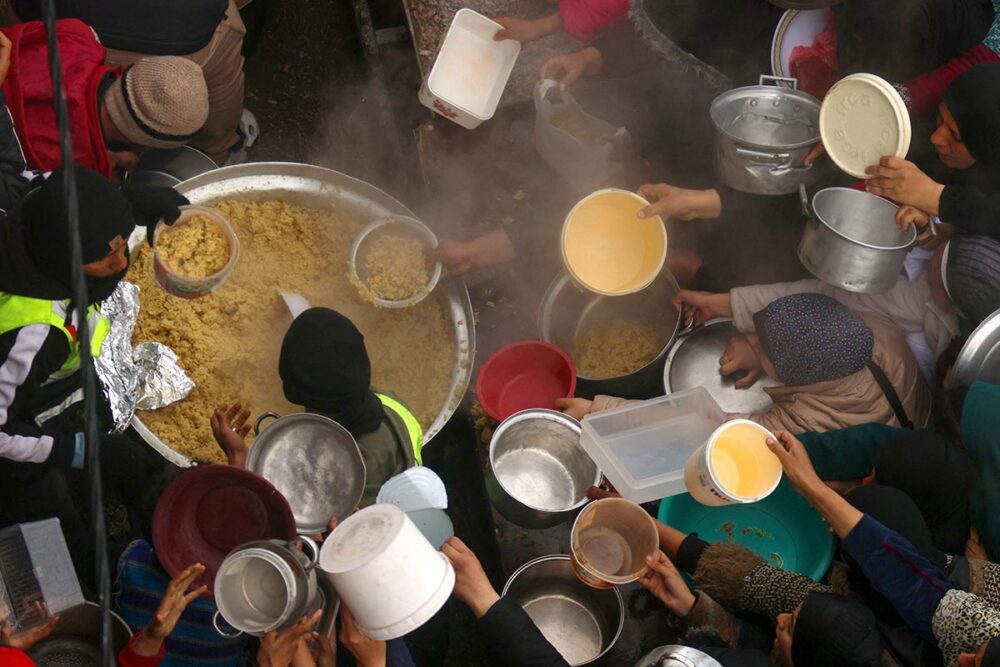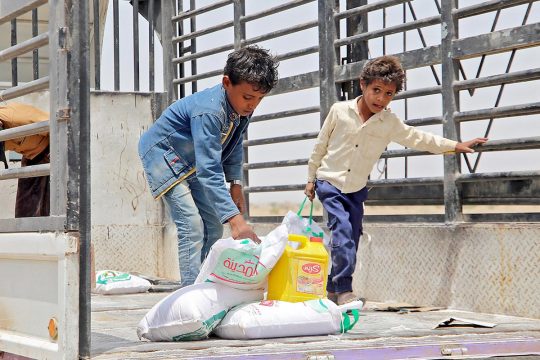“You have to hear this to believe this. The International Criminal Court in the Hague is contemplating issuing arrest warrants against senior Israeli government and military officials, as war criminals. ” On 30 April 2024, Israel’s Prime Minister Benjamin Netanyahu released a four-minute video statement addressing mounting speculation among international and Israeli media that senior Israeli officials could soon be subject to arrest warrants from the International Criminal Court (ICC). It is speculated that they will be accused, among other things, of deliberately depriving Gazans of food. On 3 May 2024, the Office of ICC Prosecutor Karim Khan put out a statement condemning any attempt to retaliate against the court for its investigations. Such actions, Khan noted, could constitute “an offence against the administration of justice” under the Rome Statute.
This is all part of a broader pattern of allegations that Israel is using starvation tactics in Gaza by denying its residents access to water and food. Journalists, scholars, humanitarian groups, and advocates for human rights have consistently accused Israel of withholding food, destroying the food system, obliterating healthcare, and blocking aid into the Gaza Strip. Just days after the 7 October attack of the Palestinian militant group Hamas in southern Israel, Oxfam, stated that the Gaza blockade is “collective punishment” and “illegal under international law”.
In March 2024, an international committee of experts issued a grave warning: famine loomed not just in northern Gaza, but threatened the entire territory. The latest Integrated Food Security Phase Classification (IPC) report painted a stark picture, projecting that 1.1 million Gazans—half of the territory’s population—would face famine by mid-July. Despite these clear indicators, starvation has persisted. Amidst the relentless media scrutiny on Gaza, what began as malnutrition is evolving into a full-blown famine, a crisis that could have been averted.
What the ICJ says about starvation
On the 11 and 12 of January 2024, South Africa and Israel made submissions before the International Court of Justice (ICJ) in The Hague. South Africa initiated proceedings against Israel under the Genocide Convention, arguing that Israel was not fulfilling its obligations not to commit, or to prevent genocide. South Africa’s submission accused Israel of violating the 1948 Genocide Convention by, among other things, intentionally subjecting a group of people to living conditions designed to bring about their physical destruction, either wholly or in part.
Right at the outset of its Application to the ICJ in December 2023, South Africa acknowledged that genocide is distinct from other violations of international law, and included “the starvation of civilians as a method of warfare” within that category of ‘other’. At the same time, it explicitly argued that the “deprivation of access to adequate food and water to Palestinians in Gaza” constituted “deliberately inflicting on Palestinians conditions of life calculated to bring about their destruction”, i.e., a form of genocide. In its decision of 26 January 2024, 16 of 17 judges ordered Israel to ensure that humanitarian aid could be effectively provided.
The fact of the matter is, however, that the ICJ hearings have been brought before the court explicitly under the genocide convention. Any starvation crimes committed by Israeli officials will therefore be discussed under the terms of the Genocide Convention: as “conditions of life” calculated and intended to bring about the “physical destruction in whole or in part” of the Palestinians as group. In terms of treaty law at the ICJ, therefore, the discussion of starvation of Palestinians in Gaza will stay couched at the level of state (rather than individual) responsibility, and genocide (rather than crimes against humanity or war crimes).
Starvation as Genocide?
Using hunger as a tactic of war is not unique to Israel. It is one of the oldest weapons of warfare, spanning from ancient conflicts to modern wars. Historically, besieging forces have deliberately cut off food supplies to starve out opponents, to weaken resistance and hasten surrender. The recognition of starvation as a criminal act dates back to the 19th century, with early mentions in the Lieber Code during the American Civil War.
Raphael Lemkin, the legal scholar who coined the term ‘genocide’ and played a key role in lobbying for the passing of the 1948 Genocide Convention, highlighted the significance of starvation as a tool of genocide. In his writings in his book Axis Rule in Occupied Europe (1944) Lemkin emphasized that the deliberate deprivation of food and resources could be used to systematically destroy a targeted group.
Lemkin’s focus on criminalising starvation was informed by his observations of Nazi policy in Germany between 1933 and 1945. To make food available for Germans during the war, Nazis had devised the ‘Hunger Plan’. This plan aimed to systematically deprive millions of Soviet citizens in occupied territories of food, serving as both a means of facilitating German colonisation and as a tool for eliminating perceived threats. Despite logistical challenges that impeded its complete execution, the fundamental principles of the plan evolved into starvation policies, especially impacting Soviet and Jewish populations.
As famine scholar Alex de Waal points out in his work Mass Starvation: the History and Future of Famine (2017), Lemkin also condemned Stalin’s actions during the 1932–33 Soviet famine in Ukraine, known as the Holodomor, as genocide through starvation. He unequivocally labeled hunger as a tool of aggression. Furthermore, he underscored its multifaceted impact, highlighting not only its physical toll on individuals but also its devastating effects on the cultural and national identity of Ukraine.
Historical reluctance to criminalize starvation
Despite Lemkin’s advocacy on the role of starvation in genocide, its prominence did not translate into the text of the Genocide Convention. While starvation was undoubtedly recognized as a genocidal tactic, its place in the convention was reduced to an implication of Article 2(c), “deliberately inflicting upon the group conditions of life calculated to bring about its physical destruction in whole or in part”.
The absence of starvation as a central focus in international law during that time can be attributed, as scholars Nicholas Mulder and Boyd van Dijk illustrate, to the utilisation of hunger as a weapon in both World Wars by the Allied powers. During World War I, the Allies (British, French, Russian and later also Italian and American fleets) imposed an economic blockade on Germany, aiming to sever crucial supply lines and undermine its military capabilities. By the war’s conclusion, an estimated 424,000 to 478,500 civilians in Germany perished due to the blockade’s devastating effects. In World War II, the United States launched Operation Starvation in 1945, targeting Japanese waterways and ports with aerial mining. This operation sought to disrupt Japan’s maritime supply routes, hindering its ability to transport essential resources and weakening its war effort. As a result, the average daily per capita food intake in Japan plummeted from 1900 calories in 1944 to 1680 calories by midsummer 1945, leading to the imminent starvation of hundreds of thousands of Japanese civilians. The clear use of starvation tactics by Allied Powers made them reluctant to categorize it as a war crime, or indeed include it explicitly in the Genocide Convention.
Only in 1977, after the occurrence of famines in Biafra during the late 1960s and in Bangladesh in 1974, where millions faced starvation due to political conflicts and natural disasters respectively, did international humanitarian law expand to address starvation. In Bangladesh, the United States withdrew its relief efforts amidst political tensions, underscoring the complexities surrounding humanitarian aid during conflicts. These crises prompted the explicit prohibition of starving civilians as a method of warfare in the 1977 Additional Protocols to the Geneva Conventions.
While this signalled a significant shift in legal responses to hunger in warfare, it is noteworthy that such a shift occurred only in circumstances where the ‘powerhouses’ of international law could clearly point the finger away from themselves, and toward distant conflicts, or scenarios in which ‘natural disasters’ or climate could also have played a role.
Subsequent milestones such as the passing, in 1998, of the Rome Statute, leading to the establishment of the ICC in 2002, marked a significant step in international law. Starvation is recognised as a war crime in the Rome Statute, and thus falls under the jurisdiction of the court. No individual before the ICC has yet been prosecuted nor subjected to an arrest warrant for the crime of starvation, however.
Difficulties of Prosecuting Starvation
However, despite this growing legal framework, cases of hunger-induced atrocities, such as those witnessed during the Cambodian and Bosnian genocides, have largely gone unprosecuted. Establishing starvation as a distinct crime is difficult because famines can have many causes such as crop failures, unequal distribution, economic problems, and political conflicts. Hunger-related deaths are often linked to infections and exhaustion, making it hard to blame starvation alone. In an international legal ecosystem focused largely on individual criminal accountability, the question arises of who to charge for the crime of starvation? Could a member of a rebel militia, or low-level perpetrator, be charged for such a crime? A successful prosecution for hunger-related crimes could perhaps only be brought successfully against a ‘leader’.
Prosecuting leaders for hunger-related crimes presents its own hurdles. Unlike direct forms of violence involving guns and explosives, starvation inflicts a slow form of suffering, making it less tangible in legal terms. Determining intent, a crucial element in legal proceedings (particularly in proving genocide), becomes particularly challenging in cases of starvation, where it can be seen as both a deliberate tactic and an unintended consequence of broader policies. The historic absence of convictions for hunger-related crimes under international law has resulted in a lack of precedent. This complicates efforts to hold perpetrators accountable for hunger crimes. Any proceedings against Israeli officials for their role in hunger crimes in Gaza would bring the ICC into untrodden territory in international criminal law.
Starvation as a war crime?
If, as some scholars have argued on X (formerly Twitter), ICC warrants do indeed focus on the denial of aid and the starvation of civilians, will it be charged as genocide? A crime against humanity? Or a war crime? The underlying acts may well be the same, but their classification will have major ramifications for international political and humanitarian rhetoric, not to mention the ICC international criminal law. If charged as genocide, the prosecutor will have to prove that the weaponisation of hunger against Gazans by Israeli officials was specifically designed to destroy the Palestinian population, and that there was intent (under the Genocide Convention ‘special intent’), to that end. Examination of the mass displacement of Gaza’s people, combined with the limiting of aid, will also likely play a key role in answering this question. What may be more likely is the charge of starvation as a war crime, which would entail an entirely different set of legal and contextual questions, but not the question of the intent to destroy the Palestinian people. An ICC warrant of Israeli officials would not only set a precedent regarding Gaza, but how hunger crimes are discussed. Any indictment will therefore be crucial, even before any arrests are made, for setting the tone of the legal debate.
An ICC process would parallel and complement the South Africa v. Israel proceedings at the ICJ. In theory, this would provide an example of international legal instruments working as they should: with the ICJ focusing on state responsibility/obligations under international treaties, and the ICC focusing on individual criminal responsibility. Observing the hearings regarding torture in Syria in October 2023, it was clear that many Syrians saw an ICJ proceeding without a complementary individual accountability proceeding as insufficient. What risks happening regarding Gaza, however, is that we see two different Hague courts trying to legally classify the conduct of the Israeli state on the one hand, and Israeli officials on the other hand, within two completely different frameworks. If two different courts are faced with two different questions, how might we interpret the answers? What will this mean for international law and its ability to reckon with hunger crimes? While many await ICC indictments, their release will undoubtedly raise more questions than answers.

Anne van Mourik is a PhD candidate at the Niod Institute for War, Holocaust and Genocide Studies and the University of Amsterdam. Until 2020 she worked as a researcher in the ‘Independence, Decolonization, Violence and War in Indonesia 1945-50’ program. Together with Peter Romijn, Remco Raben and Maarten van der Bent she worked on the research project about the ways politicians and colonial administrators dealt with large-scale violence. Her current research explores victimhood/perpetrator discourses with regard to German hunger during and after both world wars.

Lucy J. Gaynor is PhD Researcher at University of Amsterdam and NIOD Institute for War, Holocaust, and Genocide Studies, examining the construction of historical narratives within international criminal trials.







